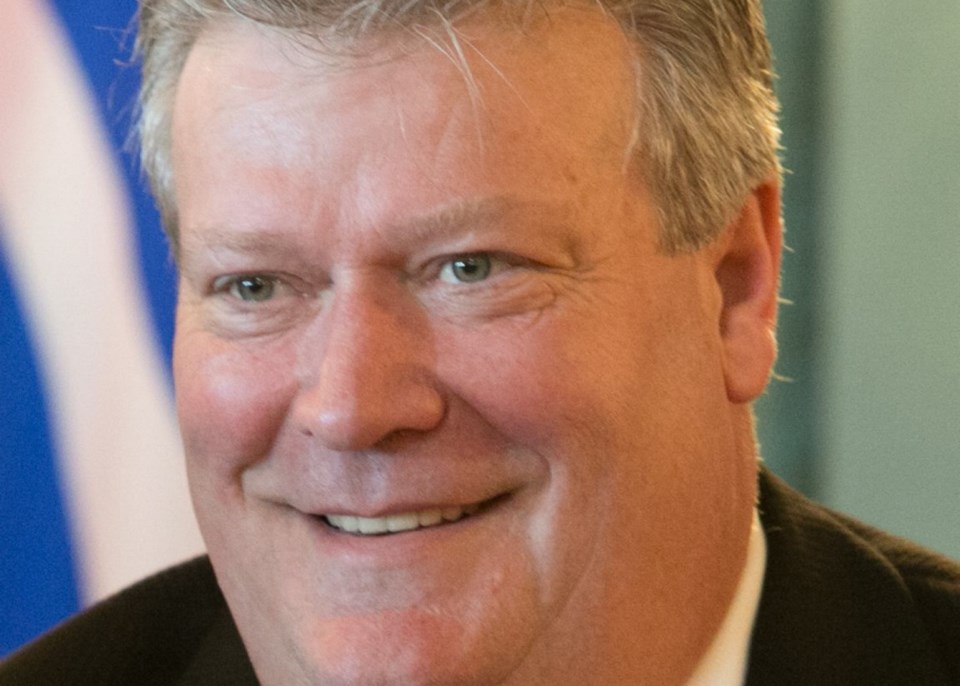 Rich Coleman abandoned all reserve Wednesday and finally posted a sort-of definitive date for when he expects some firm decisions on the liquefied natural gas ventures.
Rich Coleman abandoned all reserve Wednesday and finally posted a sort-of definitive date for when he expects some firm decisions on the liquefied natural gas ventures.
It’s 2015. That gives him 11 months and three weeks to plan the big announcement the government has been working toward for three years. Not exactly a narrow window. But it’s a bit firmer timeline than the government has put forth so far. There was a brash prediction a few years ago from Premier Christy Clark (who else?) that an LNG plant would be up and running by 2015. That wishful thinking fell by the wayside and was replaced with a projection of three plants by 2020.
As to when all the preliminary pieces might fall in place, including the fundamental decisions by investors to actually commit to the projects, the government has been quite circumspect on predicting them.
Coleman, the natural gas development minister, estimated a final investment decision from one proponent might happen in late 2014, based on what the Malaysian giant Petronas was telling him. It didn’t happen. The firm fussed and fretted about its huge B.C. play, but last month officially “deferred” it indefinitely.
On Wednesday, Coleman released a lay-of-the-land piece on the big LNG vision and took another optimistic squint into the future.
“After three years of planning, we anticipate B.C.’s LNG industry will take flight in 2015 as leading proponents make final decisions to move forward,” he said.
The rest of the piece was another round of positivity about the potential prosperity that lies ahead. “As many as 100,000 new jobs,” with British Columbians “first in line” for many of them. He cited more signed benefit agreements this year with First Nations.
Summing up 2014, Coleman said the competitive policy framework was put in place that defines the playing field, with an income-tax system that gives investors certainty and emission limits that will make any plants the cleanest in the world.
“Industries’ responses have been positive,” he said.
That’s open to interpretation. The investors that responded publicly to the moves were polite enough. No one condemned the B.C. government. But more generally, anyone could be forgiven for expecting that a positive response from industry would include a decision to actually go ahead and build a plant.
And none of them put their money where their mouths are.
Petronas, the lead dog in this hunt, issued statements citing decreasing demand and downward pressure on prices. It said the overall Canadian approach threatens the global competitiveness and could put the project off by 10 or 15 years.
The firm praised Clark and Coleman for meeting the deadlines for setting the table. But it officially deferred the decision because of the overall economics, including the high costs in B.C. that it now says have to be reduced.
That’s like praising your hosts for creating such a lovely dinner, but not sitting down to actually dig in. It’s a positive response, but an empty one.
So Coleman is hanging his prediction for this year on some of the 17 other proposals in the works.
They are still drilling for gas and paying big bucks for exploration rights, Coleman noted. But it’s LNG that’s the break-out move that will spark “unprecedented growth,” should it come to pass.
And if it doesn’t?
Back in April in the legislature, Coleman outlined the stakes.
“Although there are billions of dollars being invested today … it doesn’t mean that you have a final investment decision. If they feel there’s a problem with those components of the project, when they sit in front of their board, the board will say: ‘Fine, we go here. We go to Mozambique. We go to central Africa. We go back to Australia. We’re going to go where there’s certainty.’ ”
“Everybody needs to understand … we need to get to final investment decision. If we get [it] then you get the billions of investment and tens of thousands of jobs. If you don’t, it’s a zero-sum game.”



